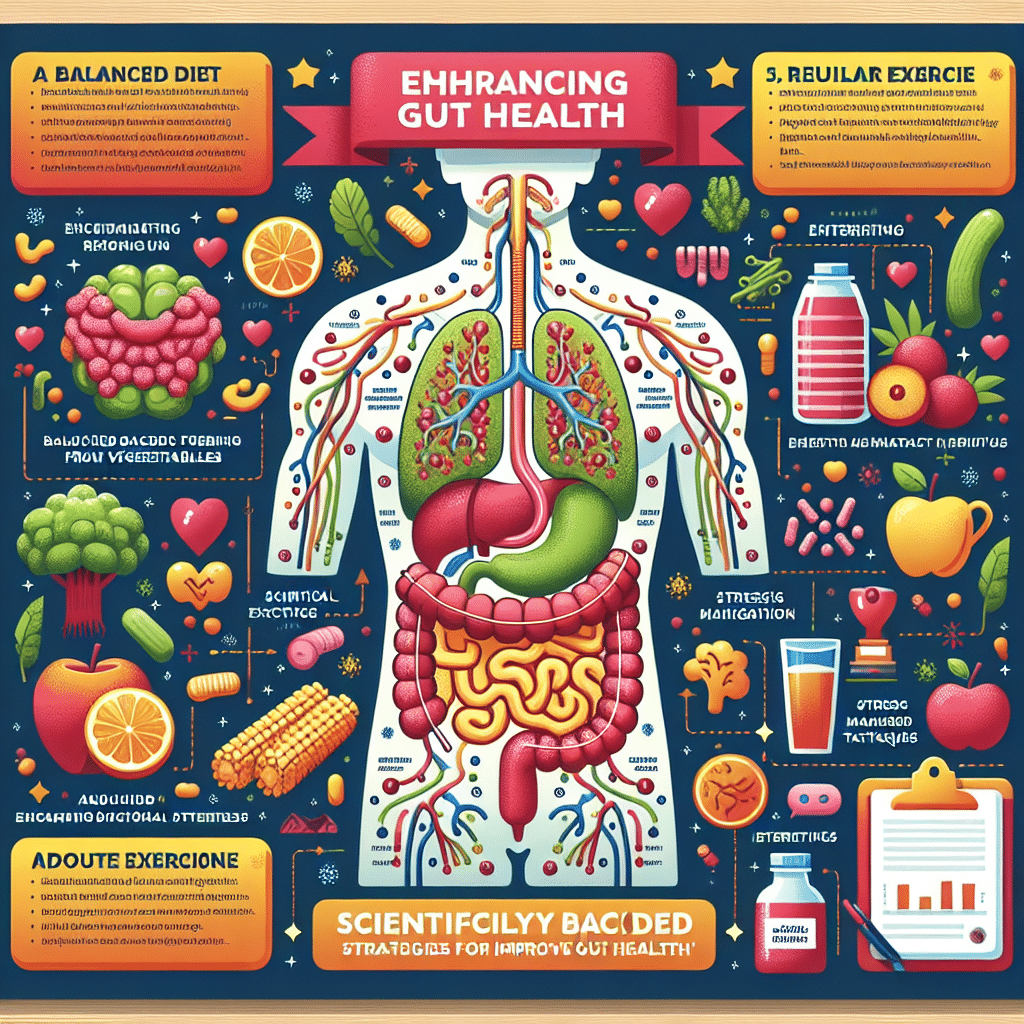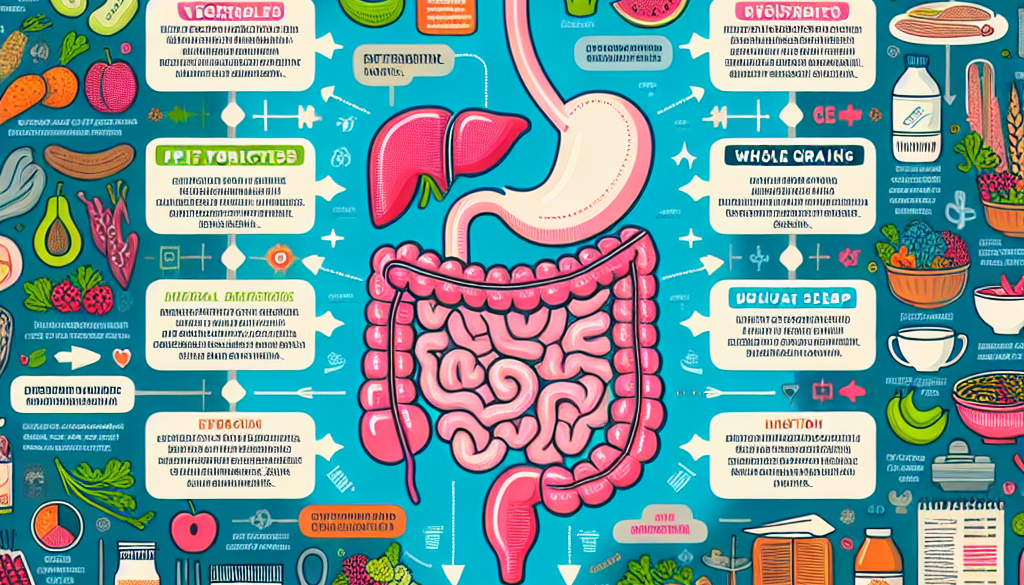Enhancing Gut Health: Effective Strategies Revealed
-
Table of Contents
- Enhancing Gut Health: Strategies for Optimal Digestive Wellness
- Understanding the Importance of Gut Health
- Probiotics and Prebiotics: Allies of the Microbiome
- Dietary Fiber: The Unsung Hero
- Hydration: Essential for Digestive Function
- Stress Management: The Gut-Brain Connection
- Limiting Antibiotics and Non-Essential Medications
- Regular Exercise: More Than Just Fitness
- Case Studies and Statistics: Real-World Evidence
- Conclusion: Key Takeaways for Enhanced Gut Health
- Enhance Your Gut Health with ETprotein’s Plant-Based Protein Products
Enhancing Gut Health: Strategies for Optimal Digestive Wellness

Gut health is a critical component of overall wellness, influencing not only our digestive system but also our immune function, mental health, and chronic disease risk. A healthy gut microbiome, which is the community of bacteria and other microorganisms living in our intestines, is essential for nutrient absorption, pathogen defense, and even the production of certain vitamins. This article delves into effective strategies to enhance gut health, supported by scientific research and expert recommendations.
Understanding the Importance of Gut Health
The human gut is more than just a digestive organ; it’s a complex ecosystem that plays a pivotal role in our overall health. The gut microbiome consists of trillions of bacteria, both beneficial and harmful. Maintaining a balance in favor of the beneficial bacteria is crucial for optimal health. Disruptions in this balance can lead to a range of health issues, including inflammatory bowel disease (IBD), irritable bowel syndrome (IBS), and even mental health disorders like anxiety and depression.
Probiotics and Prebiotics: Allies of the Microbiome
- Probiotics: These are live beneficial bacteria found in certain foods and supplements. They can help restore the natural balance of your gut microbiome. Examples include Lactobacillus and Bifidobacterium, which are found in yogurt, kefir, and fermented foods.
- Prebiotics: These are non-digestible fibers that feed the beneficial bacteria in your gut. Foods rich in prebiotics include garlic, onions, leeks, asparagus, and bananas.
Incorporating a combination of probiotic and prebiotic foods into your diet can promote a healthy gut microbiome and improve digestive health.
Dietary Fiber: The Unsung Hero
Dietary fiber plays a crucial role in gut health by promoting regular bowel movements and preventing constipation. It also acts as a prebiotic, providing nourishment for beneficial gut bacteria. High-fiber foods include fruits, vegetables, whole grains, legumes, nuts, and seeds. Aiming for a diverse intake of fiber-rich foods can enhance the diversity of your gut microbiome, which is associated with better health outcomes.
Hydration: Essential for Digestive Function
Drinking adequate water is essential for maintaining the mucosal lining of the intestines and supporting the digestion and absorption of nutrients. Dehydration can lead to digestive discomfort and constipation, negatively impacting gut health. Aim for at least 8 cups of water per day, or more if you’re active or live in a hot climate.
Stress Management: The Gut-Brain Connection
Stress can have a profound impact on gut health due to the gut-brain axis, a bidirectional communication pathway between the central nervous system and the enteric nervous system of the gut. Managing stress through techniques such as meditation, exercise, and adequate sleep can help maintain a healthy gut microbiome and prevent gastrointestinal issues.
Limiting Antibiotics and Non-Essential Medications
While antibiotics are life-saving drugs, their overuse can disrupt the gut microbiome by killing off beneficial bacteria along with the harmful ones. Only use antibiotics when prescribed by a healthcare professional, and discuss the potential impact on your gut health. Similarly, certain other medications, like proton pump inhibitors and nonsteroidal anti-inflammatory drugs (NSAIDs), can affect gut health if used excessively.
Regular Exercise: More Than Just Fitness
Regular physical activity has been shown to positively influence the composition and diversity of the gut microbiome. Exercise can enhance the growth of beneficial bacterial species, reduce inflammation, and improve gut motility. Aim for at least 150 minutes of moderate-intensity exercise per week, as recommended by health authorities.
Case Studies and Statistics: Real-World Evidence
Several studies have demonstrated the impact of diet and lifestyle on gut health. For instance, a study published in the journal “Gut” found that a diet high in fruits and vegetables led to an increase in the diversity of gut bacteria, which is linked to a lower risk of chronic diseases. Another study showed that regular exercise altered gut bacteria composition in a way that could potentially reduce the risk of obesity and metabolic diseases.
Conclusion: Key Takeaways for Enhanced Gut Health
Enhancing gut health is a multifaceted approach that involves a balanced diet rich in probiotics, prebiotics, and fiber, adequate hydration, stress management, judicious use of medications, and regular exercise. By adopting these strategies, individuals can support their digestive system and overall health.
Enhance Your Gut Health with ETprotein’s Plant-Based Protein Products
ETprotein offers a range of plant-based protein products that can support gut health. Their organic, non-GMO, allergen-free proteins, such as rice protein, pea protein, and pumpkin seed protein, are excellent additions to a gut-friendly diet. These plant proteins are not only rich in essential amino acids but also provide dietary fiber that can promote a healthy gut microbiome. Consider incorporating ETprotein’s high-quality protein products into your diet for an added boost to your digestive wellness.
About ETprotein:
ETprotein, a reputable plant protein vegan protein Chinese factory manufacturer and supplier, is renowned for producing, stocking, exporting, and delivering the highest quality organic bulk vegan protein and plant proteins. They include Organic rice protein, clear rice protein, pea protein, clear pea protein, watermelon seed protein, pumpkin seed protein, sunflower seed protein, mung bean protein, peanut protein etc. Their offerings, characterized by a neutral taste, non-GMO, allergen-free attributes, cater to a diverse range of industries. They serve nutraceutical, pharmaceutical, cosmeceutical, veterinary, as well as food and beverage finished product distributors, traders, and manufacturers across Europe, USA, Canada, Australia, Thailand, Japan, Korea, Brazil, and Chile, among others.
ETprotein specialization includes exporting and delivering tailor-made protein powder and finished nutritional supplements. Their extensive product range covers sectors like Food and Beverage, Sports Nutrition, Weight Management, Dietary Supplements, Health and Wellness Products, and Infant Formula, ensuring comprehensive solutions to meet all your protein needs.
As a trusted company by leading global food and beverage brands and Fortune 500 companies, ETprotein reinforces China’s reputation in the global arena. For more information or to sample their products, please contact them and email sales(at)ETprotein.com today.














